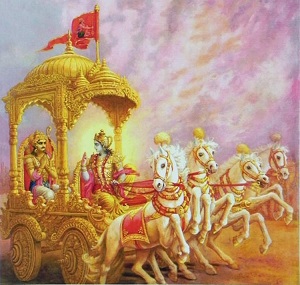Dharma, which means righteousness or the right way to live, is an integral part of the epic ‘Mahabharata’ as it separates the religious Pandavas and the irreligious Kauravas. Dharma is a set of rules for behavior or a code of conduct. Those who follow these rules are righteous and those who do not are unrighteous.
However, it is not as simple as that. What are these rules? Who enforces them? Such questions are answered by the Mahabharata.
To understand the rules, one must look at behaviour of the Dharmic Pandavas and the Adharmic Kauravas. The Pandavas, especially Yudhishtra, were extremely righteous in conduct which was why the Lord, Krishna, was always on their side. So we can infer from this that God is always on the side of the righteous.
The Pandavas were kind and courteous, always eager to serve elders and amicable to all. Till the very end, they always tried to seek peace and reconciliation with their warmongering cousins. The Kauravas, on the other hand were disrespectful, scheming and violent in nature. From the attempt at Bhima’s life at a very young age, to the dice game and the subsequent atrocities committed, Duryodhana and the Kauravas behaved in a manner contrary to Dharma. They disrespected and disregarded the advice and suggestions of wise elders like Bhishma, Drona, Kripa and Vidura, and often mocked them to their face. From this, we can see a few tenets of Dharma. Thus, those who act in accordance with Dharma, are courteous and amicable to all, respectful towards elders and seek peace above all else. They are not affected by jealousy, greed and vanity like Duryodhana was, nor do they seek to harm others in order to achieve their goals.
One of the most important lessons of the Bhagavad Gita, an essential part of the epic and a goldmine of wisdom, is that those who follow Dharma discharge their duties without question. In those days, a Kshatriya’s duties were to administer, protect and lead a kingdom. As such, a Kshatriya could not simply give in to foes without a fight and leave his duties. Doing so would be an affront to the people as if irreligious people like Duryodhana got their hands on the kingdom through scheming and deceit, it was the duty of the just rulers, the Pandavas, to reclaim the kingdom and the save the people from the corrupt regime that would inevitably follow. So, Krishna advised Arjuna, in the Bhagavad Gita, to do his duties and work for the betterment of humanity. In the present world, these duties would be feeding one’s family or working for the betterment of one’s country. If one desists from one’s duty, he/she is adharmic.
Thus, from all of this, we can draw a rough conclusion of what Dharma is. It is a set of rules that asks humans to treat all with respect and love, treat elders with reverence, seek peaceful resolutions to conflict, discharge one’s duties without complaint and not be led by emotions such as anger, jealousy, pride, greed and ego. As to the question of who is the enforcer of said rules – the answer is clear. It is God, and in the case of the Mahabharata, Lord Krishna, his Avatar.
Thus, if a person follows the tenets of Dharma and lives a virtuous life in service of God and humanity, he will find happiness, prosperity and respect from one and all.




